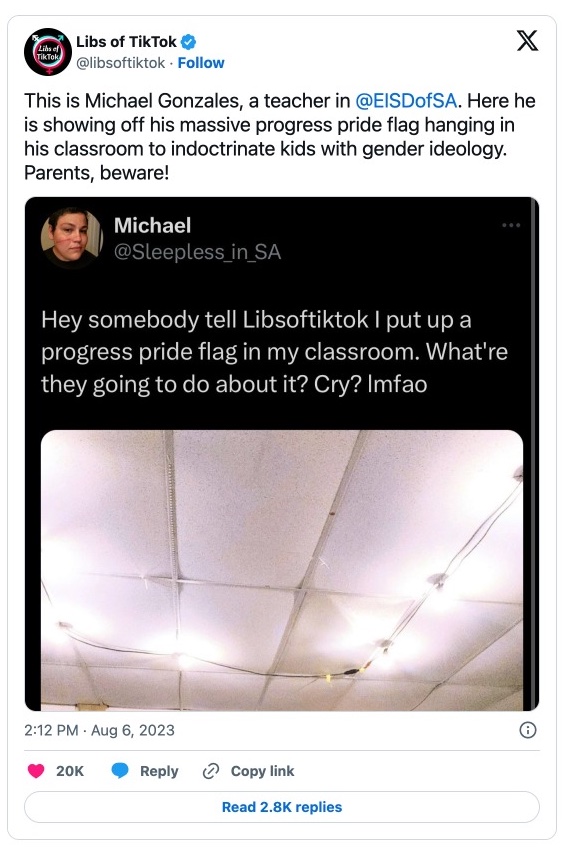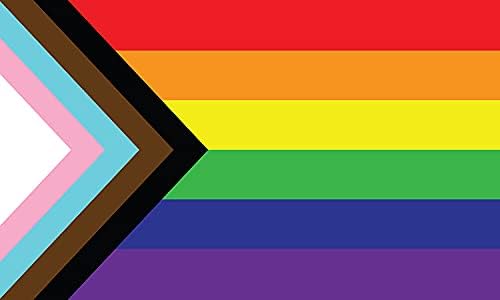A teacher at Learn4Life Edgewood of San Antonio—a public charter school in the Edgewood Independent School District (EISD)—Gonzales posted a picture of himself in his classroom in front of a “progress” pride flag on Twitter, daring Libs of TikTok, a conservative troll account that frequently targets queer people, to go after him.
“Hey somebody tell @Libsoftiktok I put up a progress pride flag in my classroom. What’re they going to do about it? Cry? Lmfao,” Gonzales wrote.
Libs of TikTok, which has 2.4 million followers, posted a screenshot of the tweet on August 6 with a comment telling parents to “beware!” and accusing Gonzales of “introctrinat[ing] kids with gender ideology.”

Then came the hellfire.
“Groomer.” “Pedo.” “Perv teacher ringing in Sodom & Gomorrah.” “Sicko.” “Freak.” “Shameless gender confused maggot.” “Sickening mutant.” “Despicable alphabet flag.”
Gonzales soon deleted his Twitter and LinkedIn accounts. Learn4Life, a nonprofit that manages the school where he teaches, placed him on paid leave for “violat[ing] our school social media policy, which is [sic] the expression of one’s own personal or political opinion on personal social media while representing Learn4Life.” Although Gonzales posted while he was not working, he was in his classroom and wore a Learn4Life t-shirt. “Our policy was nonetheless violated,” Learn4Life said in a statement.
As Melissa Mano at the San Antonio Express-News, who first reported the story, pointed out, the imbroglio shows how deeply culture-war politics invade the classroom. But it also shows that, in Texas, the right wing is winning.
The pride flag is a Rorschach test. In the photo, some see an innocuous expression of LGBTQ+ identity. It says the teacher—and by proxy, the school—support full equality for queer members of society and tells LGBTQ+ students, You’re welcome; you’re safe here.

But those primed by conservative gay-bashing propaganda see monsters bent on corrupting kids. They do not see a teacher who has dedicated his life to educating Edgewood’s youth. Who helps kids with homework after class gets out. Who is some kid’s favorite teacher. They see a “pedo” and a “groomer”—terms that have become shibboleths on the right—intent on brainwashing kids.
Learn4Life declined to make Gonzales available for an interview. Because “this is a pending personnel issue,” the organization said it could not comment on whether Gonzales was aware of its policy before he was sanctioned, how long Gonzales would be on leave, or if he would ultimately return to work.
Learn4Life and EISD appear to disagree on what Gonzales did wrong. Learn4Life faulted him for drawing unnecessary attention to his classroom on social media. EISD—which said it was unaware the incident had occurred and does not govern its charter schools—took issue with him violating district policy, which “prohibits educators from expressing their personal or political viewpoints.” The number of charter organizations like Learn4Life, which allow schools to operate largely free from government oversight, has ballooned in Texas since the Legislature authorized them in 1995; more than 700 of these institutions now enroll 300,000 students.
Lauren Blevins, director of marketing and communications at EISD, answered Texas Observer’s emailed questions sincerely and at length. (You can read the district’s original statement on August 6 here and Blevins’ full answers to our questions on August 17 here.)
“What’s frightening about these kinds of policies and laws is that they are so open to interpretation, what you think is political, I might not believe is political.”
“Expression in the classroom must be neutral and free from personal biases or beliefs,” the district said in its statement. “The display of a pride flag is based on an employee’s personal viewpoint. As such, it cannot be displayed in the classroom.”
“The pride flag could be interpreted as an expression in support of certain changes in the law or policy and thus political expression,” Blevins added.
Neither EISD nor Learn4Life would comment on the discrepancy, so one must assume Gonzales got in trouble for both. But the crosstalk is not surprising given the vagueness of the rules about what teachers can and can’t say. Gonzales drew attention to his classroom on social media in a way that clearly disrupted instruction. But banning the expression of personal or political beliefs is suspect. It is censorship that most disrupts education, and that is what Learn4Life is doing.
“Lots of valid classroom conversations could run afoul of such a vague policy,” said Amy Sanders, a lawyer and associate professor at the University of Texas at Austin’s School of Journalism and Media.
The prohibition on political speech is incoherent because what counts as “political” is subjective. And when a policy lacks specificity, educators fill in the gap; to play it safe, they censor themselves more than the letter of the law prescribes. This chills expression and prohibits critical inquiry, which lie at the heart of learning.
“I may not want to teach a high school civics class in a district that has a policy that doesn’t allow educators to express political viewpoints,” Sanders said. “What’s frightening about these kinds of policies and laws is that they are so open to interpretation, what you think is political, I might not believe is political.”
Blevins said state law requires the district to display the Texas and American flags and that, while the pride flag is inherently political, “The US flag is a symbol which represents justice and opportunity for all of Americans, regardless of their race, national origin, sex, disability or color. It represents the collective values, sacrifices and achievements of all Americans. Additionally, the District teaches its students that core American values—freedom, individualism, equality, justice, and progress—are inherently non-political.”
Someone tell George Washington that freedom is not political.
EISD is in the unenviable position of kowtowing to the prejudices of white, straight dudes in the Legislature and to the trolls following Libs of TikTok—all the while trying to assure its LGBTQ+ students it does not discriminate. Its problem is not with what teachers believe but with what beliefs they display.
Queer people are not allowed to show and be who they are in classrooms because conservatives think we’re immoral, gross, and a threat to children. That’s the message that banning pride flags sends. Gonzales and any queer kid in one of his classes now know this. You can’t get around it.
The district said that despite the restriction, it “fosters a diverse and inclusive learning environment that respects the rights and identities within our school community, regardless of their sexual orientation, gender identity, or transgender status,” as required by Bostock v. Clayton County, the Supreme Court ruling in 2019 that found discrimination based on sexual orientation and gender identity violates Title VII of the Civil Rights Act.
Blevins further noted that, while EISD does not currently have a gay-straight alliance as many schools around the country do, it forbids bullying, makes resources like the Trevor Project and GLBTQ Legal Advocates & Defenders (GLAD) available to those who struggle, and hosts an LGTBQ+support group, SAGA (Student Access Gay Alliance), at JFK High School.
Queer people are not allowed to show and be who they are in classrooms because conservatives think we’re immoral, gross, and a threat to children.
“The District wishes for its students, parents, staff, and all of the District community to understand that the recent suspension is not intended to send a message that LGBTQ+ kids are not welcome or that inclusivity is a political stance,” Blevins said. “All District students are welcome and for those who are struggling because of their sexual orientation or gender identity, we are here to help.”
EISD’s good intentions are clear, but policies that lack specificity privilege those with decision-making power.
“Vague law lends itself to being arbitrarily enforced, and what that means is that it’s likely to be enforced in a way that reaffirms the sort of dominant ideology of the space,” Sanders said. “Limiting conversations to those that are acceptable to people who have that dominant ideology limits the diversity of views that our students get access to.”
Sanders said policies limiting freedom of expression leave “our teachers open to being targeted.”
“I don’t think that’s fair to teachers, don’t think it is in the best interest of our students, and don’t think that’s what a majority of parents who send their kids to public schools would want,” she said.
First Amendment law around what K-12 teachers can say is murky. According to Sanders, it is not clear whether Gonzales’ free speech rights extend to his classroom. Teachers are not permitted to display Nazi paraphernalia in class if it’s not related to instruction; the question is whether they can express other viewpoints on which there is no public consensus.
“The real challenge is that case law is mixed,” Sanders noted. “So there are no clear bright lines that say what teachers can and can’t say in the classroom.”
Teachers don’t lose their First Amendment rights when they walk into a school. Last year, the Supreme Court found that a high school football coach could lead post-game prayers with his players at the 50-yard line. “Learning how to tolerate speech or prayer of all kinds is ‘part of learning how to live in a pluralistic society,’ a trait of character essential to ‘a tolerant citizenry,’” the Court wrote.
But educators are required to teach the state-mandated curriculum.
“In a K-12 setting, unfortunately, teachers don’t have a lot of academic freedom,” Sanders added. “The First Amendment only protects us from government intervention.”
EISD is a government entity while Learn4Life is a charter organization operating a public school.
“There are no clear bright lines that say what teachers can and can’t say in the classroom.”
Hence the linguistic acrobatics that try to explain why the pride flag is political while the American one is not: The Supreme Court has held that viewpoint-based restrictions on speech violate the First Amendment.
“The school might argue that this faculty member displaying a flag has caused a disruption, but, again, I think it’s more suspect because they’re picking out a specific viewpoint, the pride viewpoint, and that goes along with the potential for discriminating against LGBTQ populations,” Sanders said.
Conflicts like the one at Learn4Life will only become more common as Republicans in the Legislature pass laws banning diversity, equity, and inclusion programs; limiting which books kids can read; and restricting how they can talk about slavery, racism, and queer history.
“The kinds of bills we’re seeing passed in legislatures, whether [it is Florida’s] ‘don’t say gay’ bill or similar legislation in Texas—those bills have a chilling effect on K-12 teachers,” Sanders said. “As we’re seeing this kind of legislation increase around the country, teachers are more and more cautious about conversations and discussions taking place in classrooms. Overall, this has an extremely negative effect on the quality of education we’re providing to students.”







